Ross Greenburg
Production
Year Inducted: 2022
The iconic HBO Sports brand is built on superior storytelling. With compelling historical documentaries, groundbreaking behind-the-scenes docuseries, first-rate broadcast journalism, and the biggest fights in boxing, HBO Sports — echoing the network’s slogan — has made a name for itself based on one philosophy: “It’s not sports. It’s HBO Sports.” And perhaps no one has played a larger role in creating that culture of excellence than Ross Greenburg.
Sports Broadcasting Hall of Famer and on-air talent Bob Costas sums it up: “The depth and quality of the programming Ross Greenburg created and oversaw at HBO Sports remains the gold standard.”
During a 33-year career at HBO, Greenburg redefined and reinvigorated the genre of sports documentaries, while also maintaining HBO Sports’ status as boxing’s preeminent destination for high-profile fights. During his time at HBO Sports — where he served as VP and executive producer (1985-90), SVP and EP (1990-2000), and president (2000-11) — he helped create HBO’s sprawling library of unforgettable sports documentaries, the trailblazing NFL Hard Knocks and the 24/7 all-access docuseries, hard-hitting broadcast-journalism shows like Real Sports With Bryant Gumbel and On the Record With Bob Costas, and beloved feature films 61 and Miracle (released on HBO and in theaters, respectively).
Since departing HBO in 2011, he has continued to solidify that storytelling legacy through the production of dozens of award-winning sports documentaries at his production company, Ross Greenburg Productions (RGP). Among his 100 major television-sports honors, Greenburg has earned eight Peabodys, 56 Sports Emmys, one Primetime Emmy, 21 Cable ACE awards, 12 Cine Golden Eagle awards, and five Video Tape Production Association Monitor awards.
“I always respected Ross’s judgment, the team approach he fostered throughout our department, and the empathy he had for his entire staff,” says former HBO Sports SVP/Executive Producer Rick Bernstein, who worked alongside Greenburg for more than 30 years. “I don’t believe there has ever been a department at HBO that was as close and collaborative as the men and women at HBO Sports, which is reflective of Ross, one of the most genuine and innovative executives in sports television.”
Die-Hard Sports Fan — With a Sentimental Streak
Greenburg grew up in Scarsdale, NY, constantly playing sports and watching as many games on television as he could. He attended Jets games with his father (at 13, Greenburg was on hand for Joe Namath’s legendary performance in Super Bowl III) and played football through high school. Meanwhile, his mother instilled a unique sense of humanity in him.
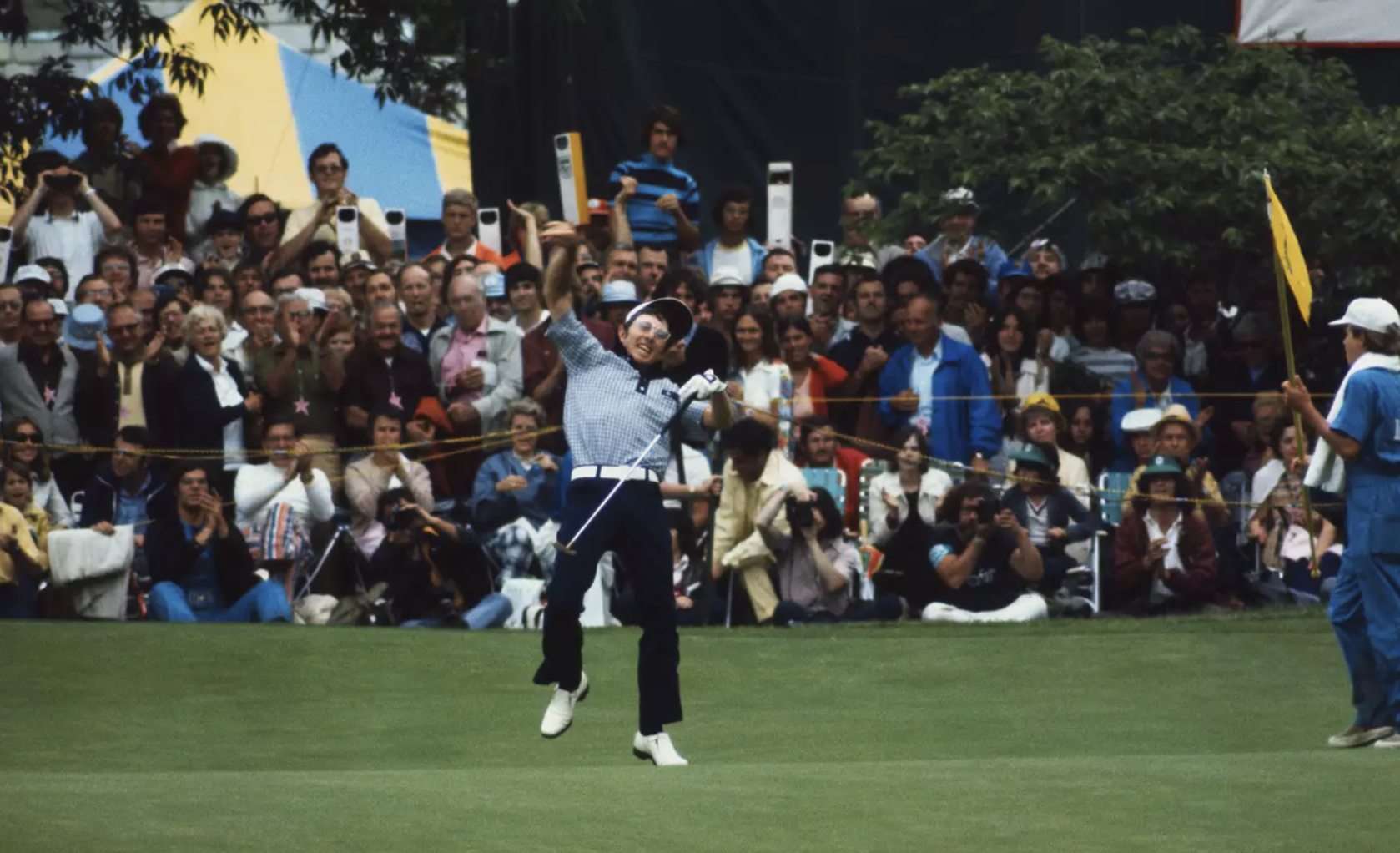
Ross Greenburg’s first sports production was as a PA for ABC Sports at the 1974 U.S. Open, colloquially known as ‘The Massacre at Winged Foot’
“I think that’s why I’m a crier to this day,” he says. “I feel a deep sense of connection to people in an emotional way, and that came from my mom, who was just an amazing human being. I was the type of kid who would hear Jim McKay delivering his flowery monologues [during] those Olympics [broadcasts] and start getting tears in my eyes. Even then, I knew that I had a special appreciation for the drama of sports.”
His start in the business came courtesy of childhood friend and classmate Kyle Gifford, son of former NFL star and Sports Broadcasting Hall of Famer Frank Gifford. After Kyle and Ross graduated from high school, the ABC announcer got them gigs as production assistants at the 1974 U.S. Open at Winged Foot Golf Club (Greenburg’s childhood home looked out at the 15th hole).
“It was like Disneyland for me,” he recounts. “That’s when I caught the bug.”
Growing Up at ABC Sports
He attended Brown University but never strayed far from sports production, working as an assistant writer for the sports news director at WPRI-TV Providence. Following his junior year, he and Kyle spent the summer traversing the Northeast working as PAs on a variety of ABC Sports productions — including Monday Night Baseball, preseason Monday Night Football, and Wide World of Sports — and golf tournaments for CBS Sports.
“I got to see so many of the greats in action: Chuck Howard, Chet Forte, Dennis Lewin, and that great group of legendary production executives,” says Greenburg. “That summer is when I knew for sure that I wanted to do this as a career.”
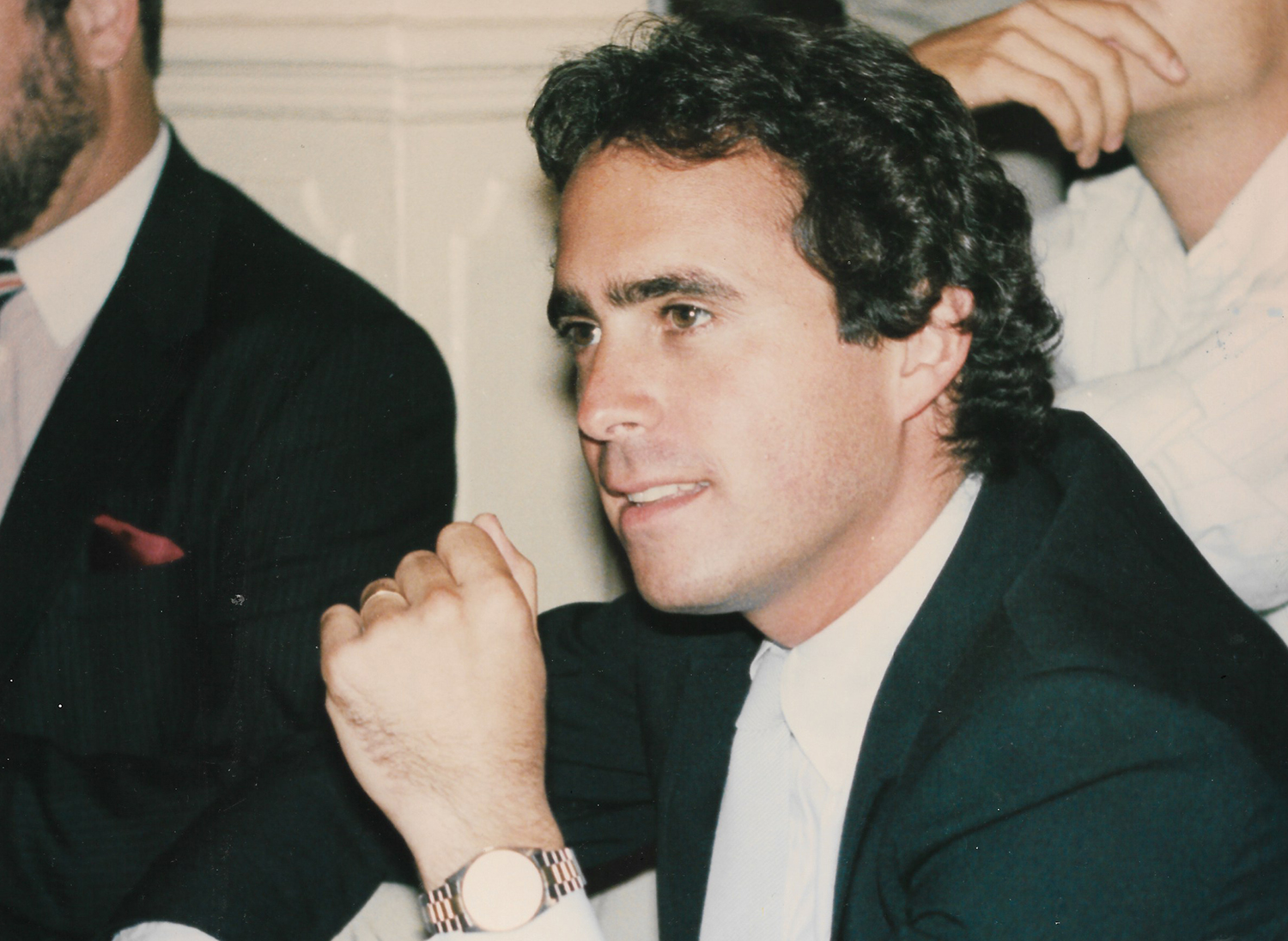
Before starting his illustrious career at HBO Sports, Ross Greenburg broke into the business as a PA with ABC Sports
Graduating with a degree in political science in 1977, Greenburg became a full-time freelancer for ABC Sports. After working baseball and golf throughout the summer and college football in the fall, he found himself running graphics for the 1977 World Series, which included Reggie Jackson’s legendary three–home-run Game 6.
“I was having the time of my life,” Greenburg recalls. “But, when the time came for [ABC to make hires], I didn’t get the staff job I was hoping for. So I went to the library searching for a source book on television networks with sports, which, at the time, was just ABC, CBS, and NBC; after that you were out of luck. But I found this cable source book, and in it was a network called Home Box Office.”
Catching On at a Fledgling HBO
Greenburg had known of HBO, which carried Knicks and Rangers games from Madison Square Garden beginning in the early ’70s, but it was still a fledgling premium cable network in a world where cable was far from ubiquitous. Nonetheless, Greenburg saw an opportunity to break into sports television and submitted his résumé.
“At that time,” he says, “there was only one person in the sports department, and he hired me as a PA. There were only two people in the sports-production department, and we were doing boxing, gymnastics, track and field, Inside the NFL, and all kinds of other programming. Suddenly, at the age of 23, I was thrown into producing live sports. It was like getting your advanced degree in television on the fly, and I just fell in love with it.”
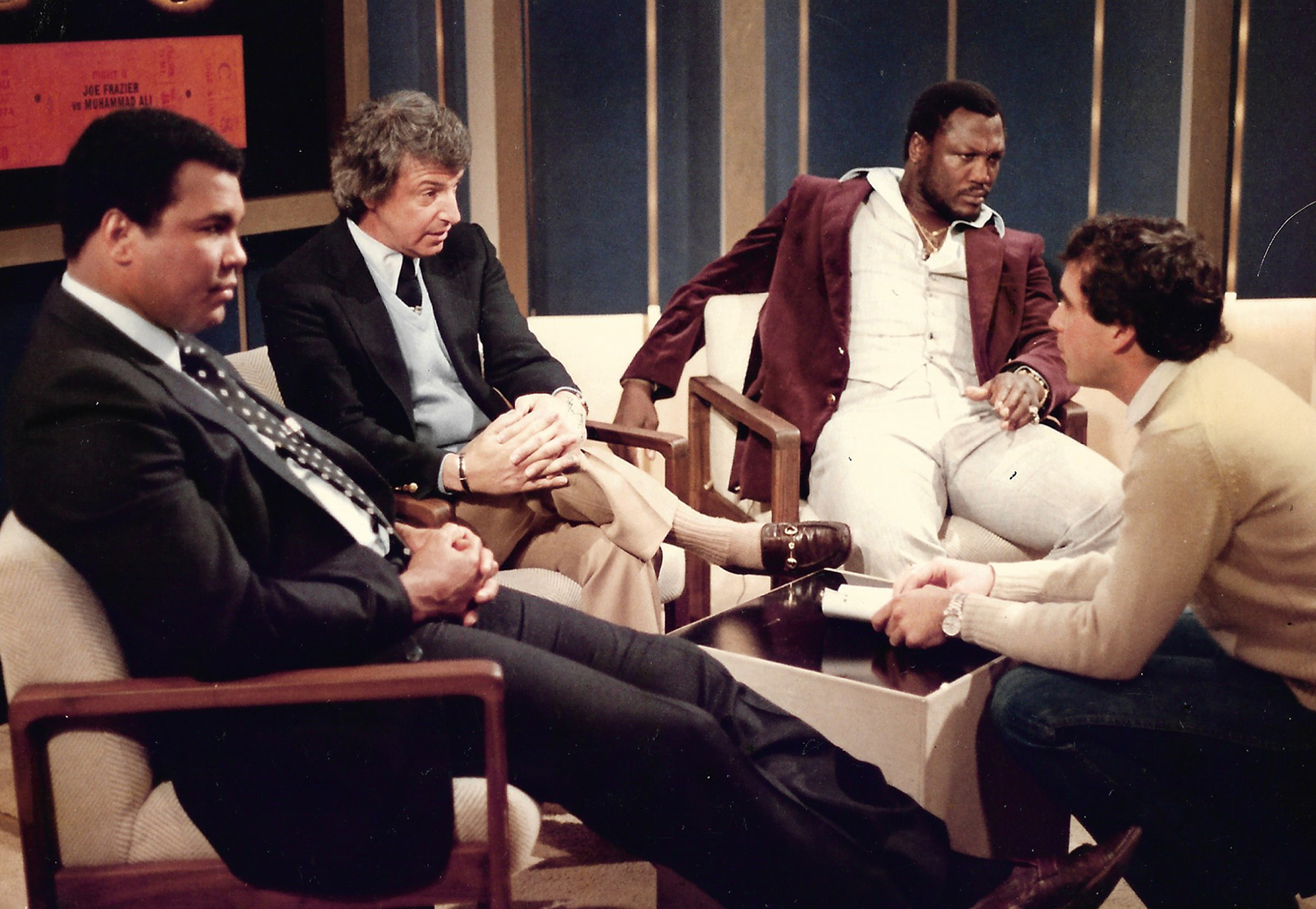
Ross Greenburg on hand for an interview to promote one of the legendary Ali-Frazier fights that aired on the early days of HBO.
In the early ’80s, HBO’s reach across U.S. households was growing rapidly, and head of programming (and eventual CEO) Michael Fuchs emphasized boosting the network’s sports programming. Although HBO carried weekday matches from Wimbledon (in the era of John McEnroe, Bjorn Borg, and Jimmy Connors) and Inside the NFL throughout football season, it was boxing that put HBO Sports on the map on a national scale.
“[Sugar Ray Leonard vs. Thomas Hearns] was really the launch pad for HBO Sports in terms of boxing,” says Greenburg. “It was September 16, 1981, and I was producing. Michael Fuchs came in the truck just before the fight, folded his arms, smiled, and said, ‘Gentlemen, we have arrived.’ I knew exactly what he meant. That was the one that launched us as the [preeminent] broadcaster of boxing.”
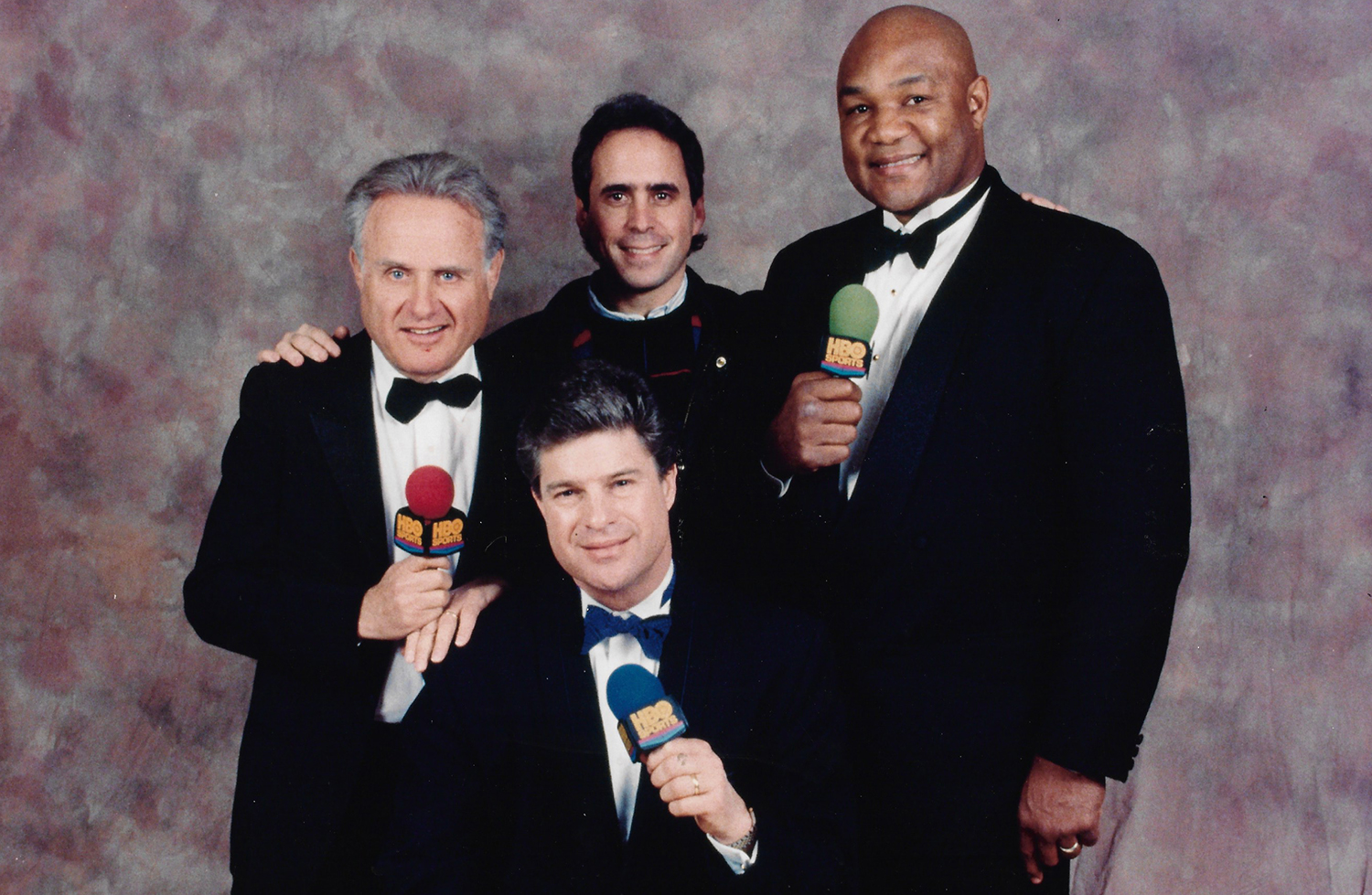
Ross Greenburg (top center) with longtime HBO World Championship Boxing Commentators (from left) Larry Merchant, Jim Lampley, and George Foreman
Although HBO carried plenty of marquee fights in the 1970s, the growth of cable in the ’80s made HBO World Championship Boxing the sport’s home for three decades, spotlighting such fighters as Marvin Hagler, Sugar Ray Leonard, Mike Tyson, Evander Holyfield, Lennox Lewis, Oscar De La Hoya, Manny Pacquiao, and Floyd Mayweather.
The Golden Age of HBO Sports Documentaries
In 1985, Greenburg became VP/executive producer and, five years later, was elevated to SVP/EP. During this period, he began to imprint his own vision on HBO Sports, a vision that greatly resembled another Sports Broadcasting Hall of Famer.
“Years later,” he says, “I told Roone Arledge, ‘All I did was take your [ABC Sports] philosophy and change the letters to HBO.’ Just like Roone, we were looking to seek out the human drama of sports and get as up close and personal as possible, while still taking a journalistic view of what we were covering. That and Michael Fuchs’s ‘It’s Not TV, It’s HBO’ mentality of always looking for programming that you couldn’t see anywhere else served as my guide.”
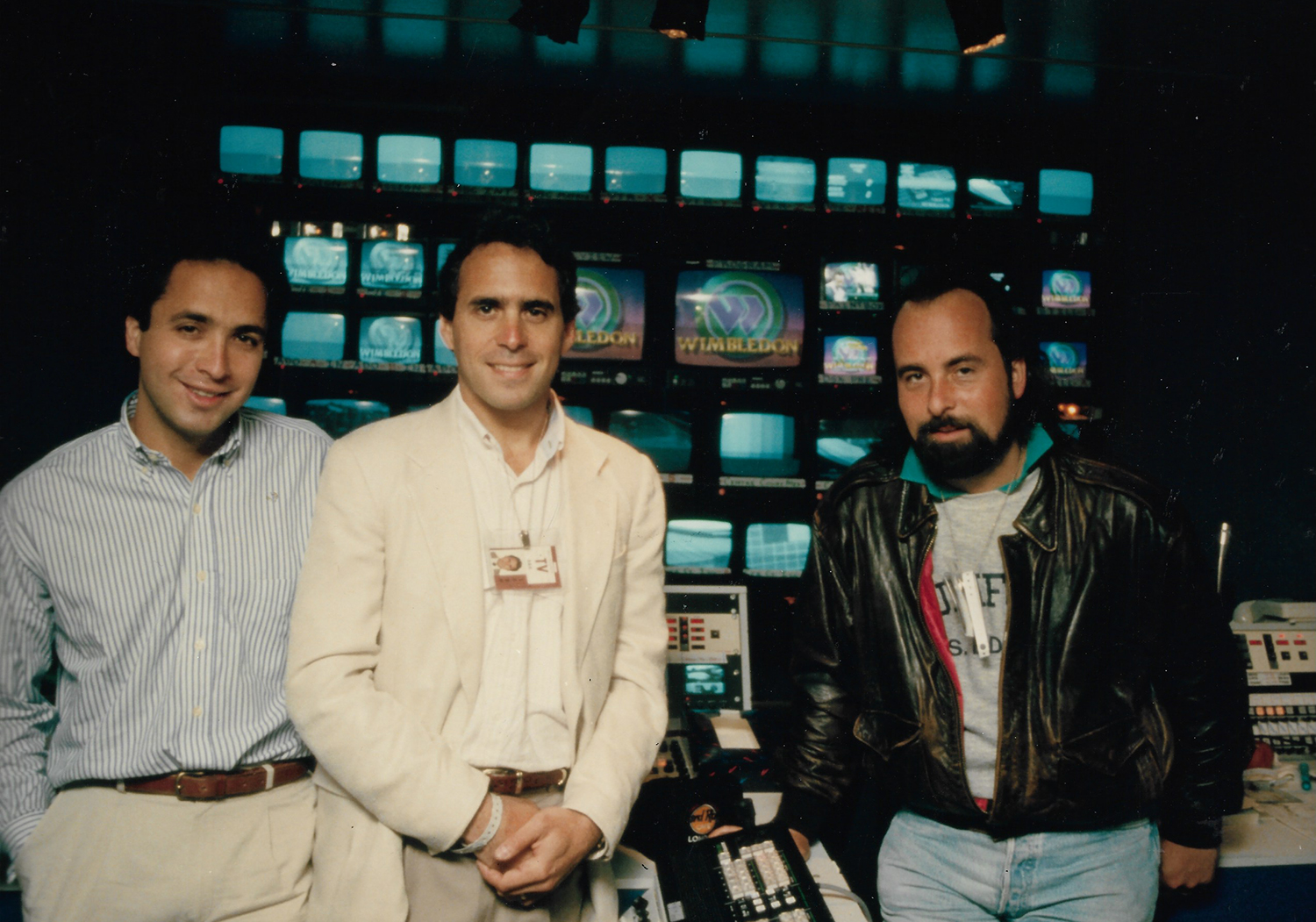
Ross Greenburg (center during one of HBO’s Wimbledon productions) aimed to model his management style at HBO Sports after one of his key idols and role models Roone Arledge.
Although HBO Sports had dabbled in documentaries for years, its efforts hit a new level in 1990 with the launch of When It Was a Game. For the three-part series on the history of baseball, Greenburg worked closely with director George Roy and producer Dave Harmon to develop what has become the signature style of HBO documentaries.
“Prior to that,” Greenburg says, “[sports documentaries] were mostly just simple interviews with athletes mixed with historic footage, but no one had developed a genuine style. Then I watched Ken Burns’s The Civil War, and I saw what was possible. We started dabbling with actors reading excerpts from magazines or books of the period, putting Foley sound onto B-roll footage from the ’30s and ’40s with the guys’ cleats hitting the dirt fields, and concentrating on music and narration. We developed what would become the style for our documentaries.”
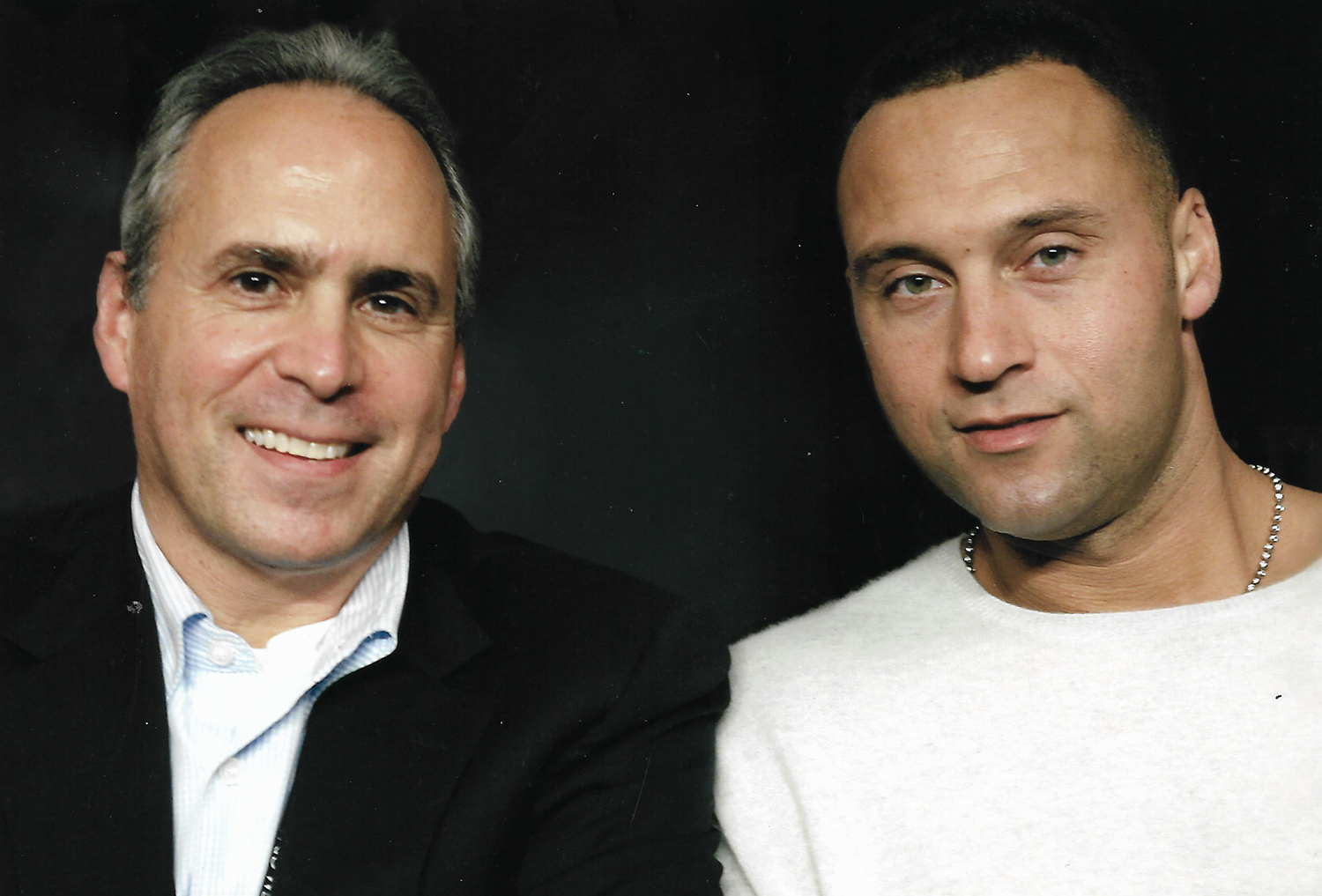
Derek Jeter 3K was among the final documentaries in a long line of masterpieces Ross Greenburg oversaw at HBO Sports.
HBO would go on to transform the sports documentary over the next two decades with films like Arthur Ashe: Citizen of the World, Babe Ruth, Do You Believe in Miracles, Mantle, Magic & Bird: A Courtship of Rivals, Lombardi, McEnroe/Borg: Fire & Ice, Derek Jeter 3K, and dozens of others.
“Ross Greenburg popularized sports documentaries and reshaped an entire genre with his unique approach and vision,” says NBA Commissioner Adam Silver, a friend since Greenburg pitched The History of the NBA documentary in the mid ’80s. “He’s a master storyteller and one of the industry’s most influential producers.”
Getting ‘Real’ With Sports Journalism
In the mid ’90s, Greenburg and his team began toying with the idea of a “hard news” program dedicated to sports. The concept was simple: a one-hour sports magazine show modeled loosely on CBS News’ 60 Minutes. He assembled a murder’s row of talent that could take sports broadcast journalism to the next echelon, and thus Real Sports With Bryant Gumbel was born.
Besides Gumbel as host, the show has featured as correspondents Sports Broadcasting Hall of Famers James Brown, Mary Carillo, and Lesley Visser and other industry giants like Frank Deford, Bernie Goldberg, and Jim Lampley.
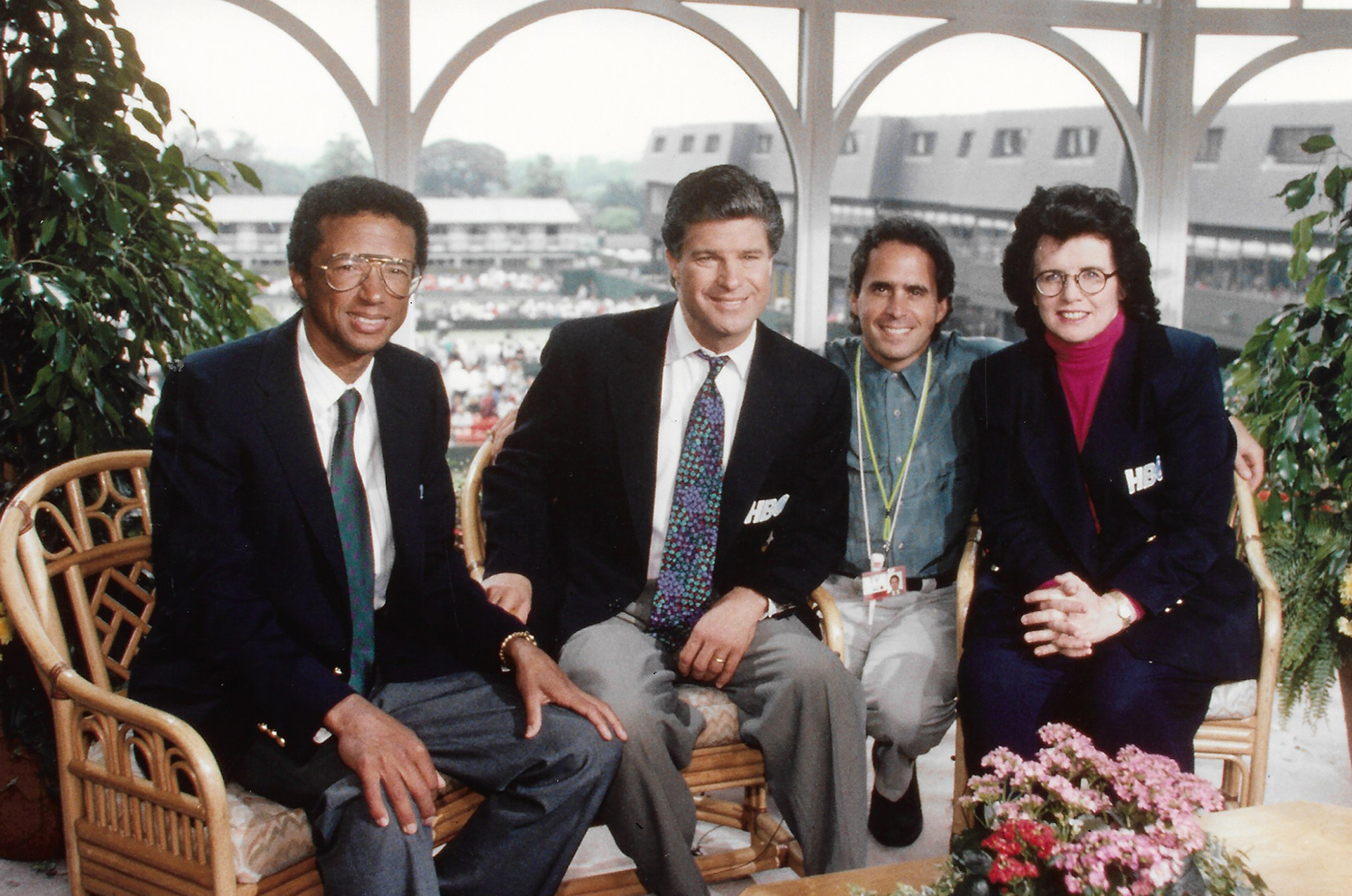
Ross Greenburg (right center) Played a vital role in the HBO Sports’ coverage of Wimbledon, which at one time featues (from left) Arthur Ashe, Jim Lampley, and Billie Jean King.
“Ross is a superb teacher who welcomed a collaborative approach in shaping a story, sharpening journalistic skills, insight, and presentation,” says Brown, whom Greenburg hired for HBO World Championship Boxing before adding him to the Real Sports roster. “He was effective because he is, himself, a journalist at heart.”
Since premiering on April 2, 1995, Real Sports With Bryant Gumbel has received 35 Sports Emmy Awards, including 20 for Outstanding Sports Journalism. It led to the launch of On the Record With Bob Costas six years later and inspired numerous other newsmagazine shows around the industry.
“I have been at HBO Sports for more than 25 years, and it has been the finest work experience of my life,” says Carillo, whom Greenburg initially tapped for HBO’s Wimbledon coverage. “Ross’s sense of story, his understanding of the athletic heart, and his commitment to inclusion are only some of the reasons he’s a Hall of Famer, but they’re certainly my favorite reasons.”
Birthing a Genre of Sports Reality TV
In 2000, Greenburg was named president of HBO Sports, and one of his first major programming moves proved to be one of the most important in the network’s history. With HBO’s documentary factory churning out gold, he set his sights on bringing that same elite storytelling to the burgeoning genre of reality TV.
“We were looking to get into reality because I knew sports was the perfect place to go behind the scenes and capture, not manufactured reality, but real reality,” he says. “I got together with [Sports Broadcasting Hall of Famer] Steve Sabol at NFL Films, who had been miking coaches and players for years and was the real genius in terms of how to get it done. We came up with Hard Knocks, and that opened a whole new door for reality television.”
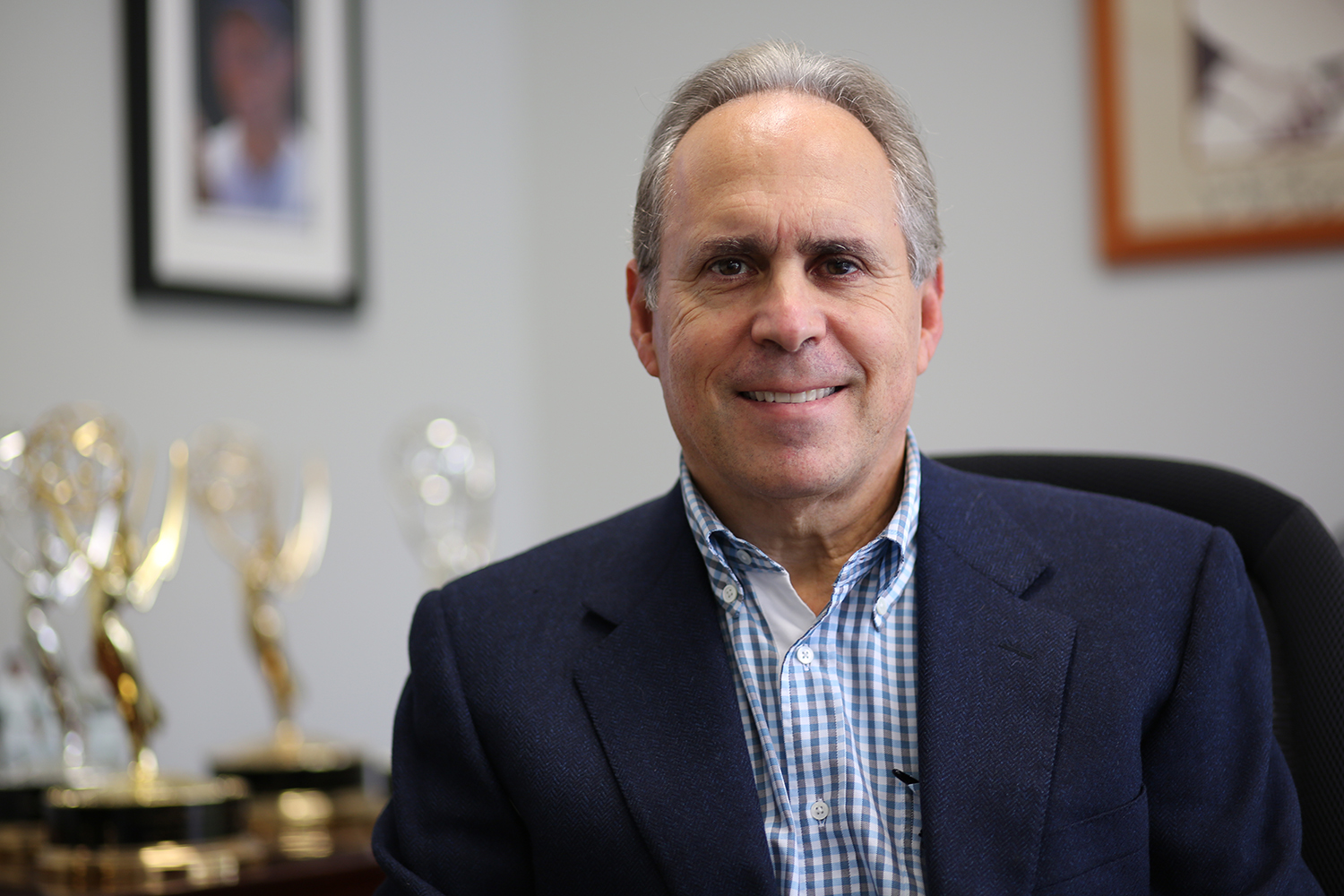
Hard Knocks and 24/7 are among the programs that have helped earn Ross Greenburg earn 56 Sports Emmys during his career.
Premiering in 2001 with the Baltimore Ravens, Hard Knocks created a genre that is now omnipresent across the sports-programming spectrum, although few programs have matched the quality of the standard bearer.
Greenburg and his team brought the Hard Knocks all-access concept into the ring with 24/7: De La Hoya/Mayweather in 2007 and 24/7: Road to the Winter Classic in 2011. Since then, more than two dozen seasons of 24/7 have been produced across HBO, Showtime, and EPIX.
“In the early days, HBO Sports was somewhat of an unheralded sports division in broadcast television,” says Bernstein. “Under Ross’s leadership, HBO Sports became the gold standard in sports television, [with] groundbreaking, smart, thought-provoking programming — a by-product of the value Ross put on journalism and storytelling with an emphasis on high-quality productions.”
Sports Stories Go Hollywood
While creating a sports-documentary dynasty, lifting sports journalism to new heights, and booking blockbuster fights, Greenburg somehow found time to serve as executive producer on multiple feature films at HBO — most notably 61*, which chronicled Roger Maris and Mickey Mantle’s race to break Babe Ruth’s single-season home-run record.
“I had attempted a few years earlier to get the rights to Mickey Mantle’s life story in order to do a film, but it didn’t work out,” says Greenburg. “Then this treatment hits my desk, and I instantly fall in love with it. [Director] Billy Crystal, [screenwriter] Hank Steinberg, and I took a year developing the script. Once we started shooting, being able to be on set for almost the entire process was like living a dream. Most important, I think we produced a hell of a movie.”
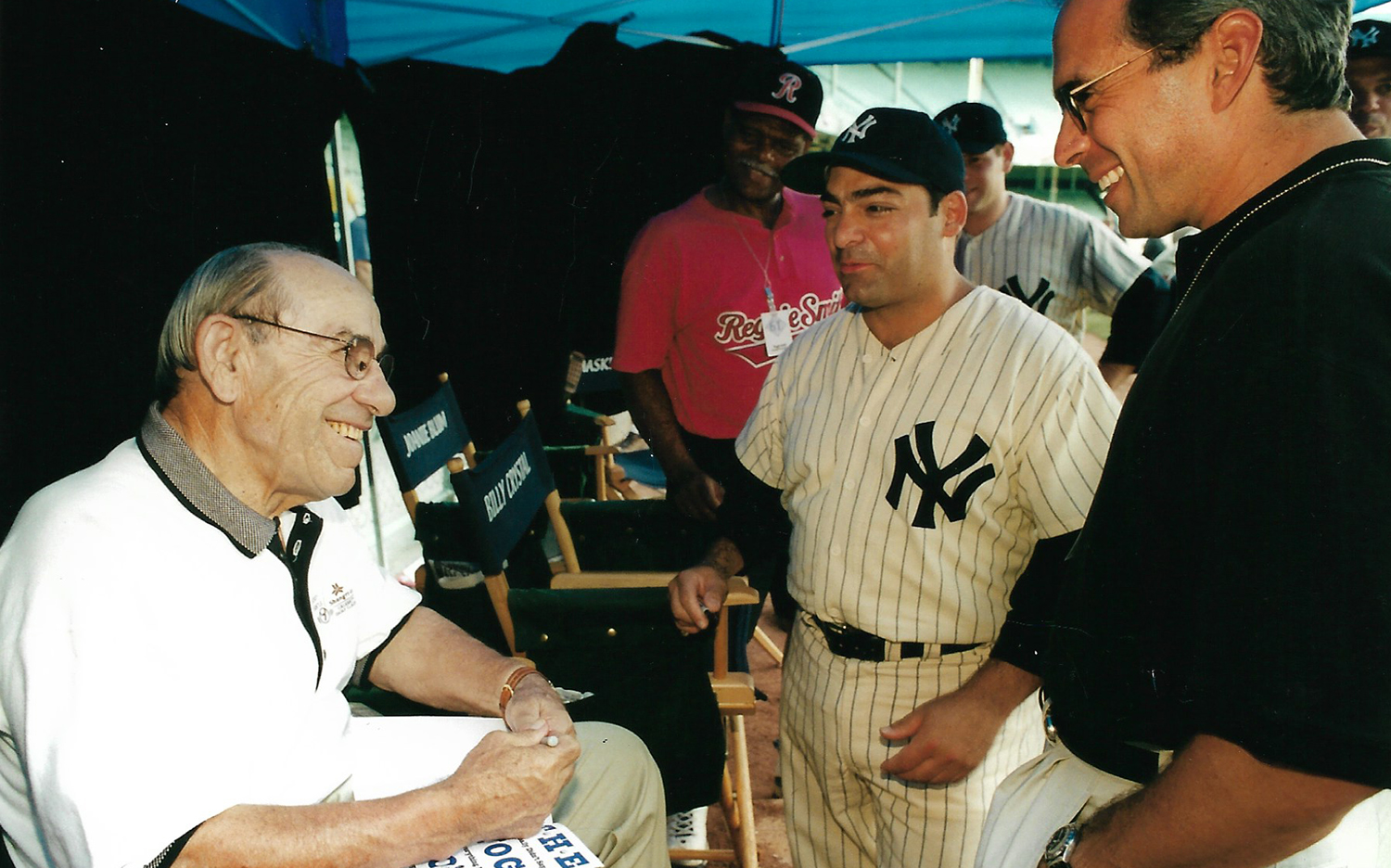
Ross Greenberg on the set of 61* with Yogi Berra
Three years later, Greenburg pitched another feature film, this time focused on the Cinderella story of the 1980 U.S. Olympic hockey team. Although HBO passed on the project, Greenburg took it to Disney, which greenlighted the movie, and it became one of the most iconic sports movies in Hollywood history: Miracle.
“That was an unbelievable experience working with director Gavin O’Connor,” says Greenburg. “I think we nailed that film. There was something magical about it, and the love for it has only grown since [it was released in 2004]. Between the documentaries and those two movies, I feel like we’ve left something behind that people will enjoy for a long, long time. There’s just something about a great sports movie or sports doc that lives forever.”
Embarking on a New Journey
By 2010, HBO Sports was hitting its stride in original programming, but Greenburg says the never-ending grind of negotiating with boxing promoters for the next big fight was starting to wear on him.
“Going to the front lines with some very tough people on a daily basis began to take up more and more of my time and took me away from some of the other things that I loved so much,” he says. “Boxing is just a different beast, and it’s a brutal business. So, in 2011, I knew it was time to move on.”
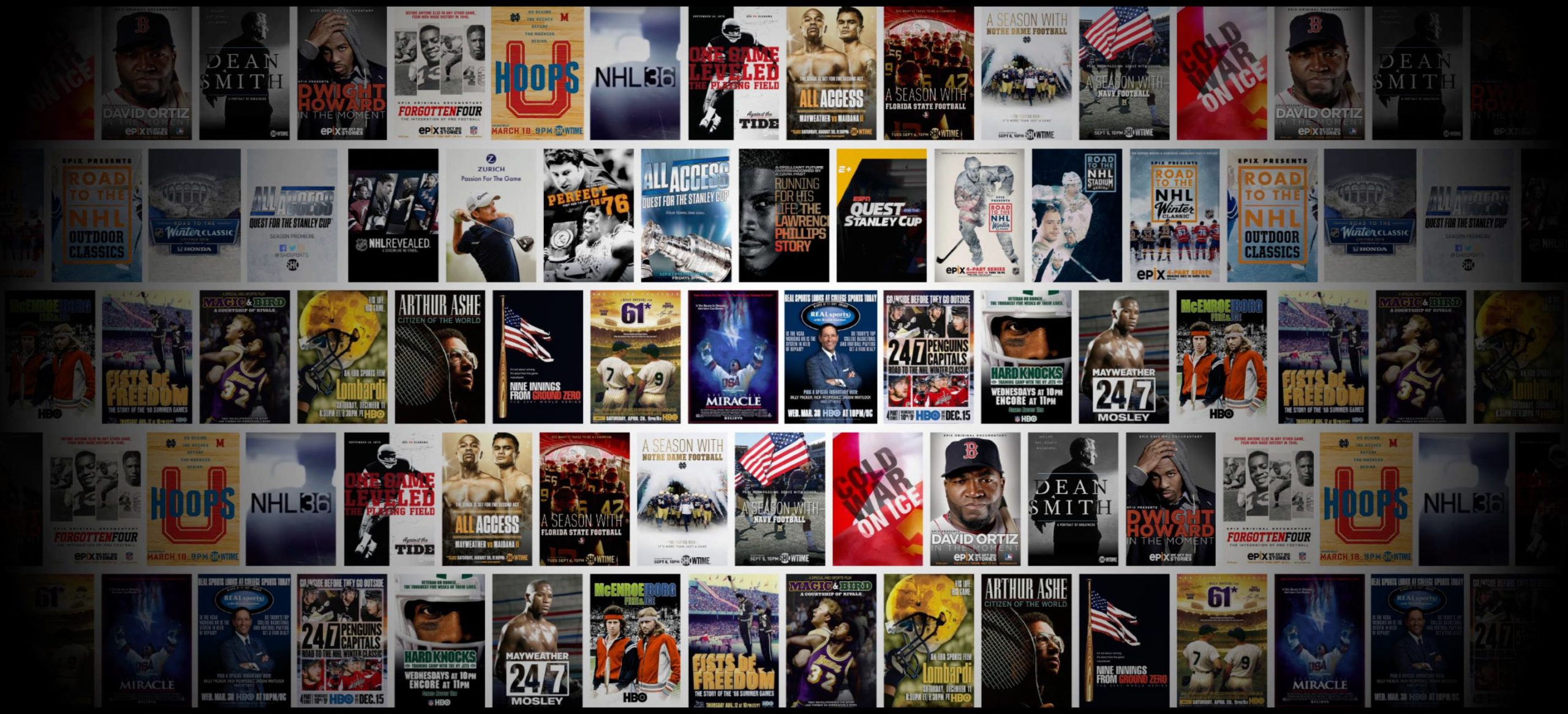
Since launching in 2012, Ross Greenburg Productions has produced more than 40 original documentaries and docuseries for CBS, EPIX, ESPN, NBC, NHL, Showtime, USGA, and others.
Far from ready to ride off into the sunset, he launched Ross Greenburg Productions with the aim of bringing the level of documentary and reality programming he had pioneered at HBO Sports to others in the industry.
RGP was quickly enlisted to produce the next edition of 24/7: The Road to Winter Classic, this time for Showtime. In addition, NBC Sports Group tapped Greenburg and his team to create original programming for NBC Sports Network, including a reunion with Greenburg’s old friend Bob Costas on Costas Tonight. Since launching in 2012, RGP has produced more than 40 original documentaries and docuseries for CBS, EPIX, ESPN, NBC, NHL, Showtime, USGA, and others.
“For more than 40 years, Ross has proved his abilities from both a creative and a management standpoint,” says Sports Broadcasting Hall of Famer and CBS Sports Chairman Sean McManus, who started out alongside Greenburg as a PA for ABC Sports in the ’70s and remains a close friend. “The high quality of his work has been clearly evident, and his impact on the industry is enormous. His legacy will be pure excellence both personally and professionally.”
Far From Finished
Today, Greenburg operates RGP out of his office in Rye, NY, and resides in Greenwich, CT, with his wife of 38 years, Michele, whom he calls “my rock and the person who has most shaped who I am today. She has been with me every step of the way and has always given me reality checks. She hasn’t just provided support; she also has a great journalistic eye and has shown me to not always see such a rosy picture of sports. I think that enabled me to do some great work over the years that might not have happened otherwise.”

Ross Greenburg remains hard at work telling great stories, including the upcoming documentary on Bill Russell (pictured here with Greenburg prior to his death earlier this year) for Netflix.
The couple have a twin son and daughter, Brad and Rachel, and welcomed a pair of grandchildren into the world in 2021. Although Greenburg says he can’t wait to spend more time with his family and new grandchildren, he acknowledges that the pull of telling a great story is likely to keep him in the sports-broadcasting business for years to come.
“I’m very lucky that I’ve been able to take so many passion projects and turn them into something special,” says Greenburg. “At this point, I probably should be thinking about hanging up the gloves, but it’s just too much fun. To this day, a great story still grabs me — just like that emotional little kid in Scarsdale who used to cry in front of the television set during a dramatic moment in the game. I think, in a lot of ways, I’m still that kid at heart.”
